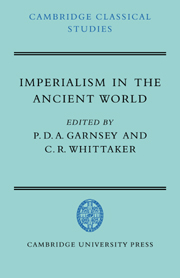Book contents
- Frontmatter
- Contents
- List of figures
- Preface
- 1 INTRODUCTION
- 2 IMPERIALISM AND EMPIRE IN NEW KINGDOM EGYPT
- 3 CARTHAGINIAN IMPERIALISM IN THE FIFTH AND FOURTH CENTURIES
- 4 SPARTAN IMPERIALISM?
- 5 THE FIFTH-CENTURY ATHENIAN EMPIRE: A BALANCE SHEET
- 6 ATHENS IN THE FOURTH CENTURY
- 7 THE ANTIGONIDS AND THE GREEK STATES, 276–196 B.C.
- 8 LAUS IMPERII
- 9 GREEK INTELLECTUALS AND THE ROMAN ARISTOCRACY IN THE FIRST CENTURY B.C.
- 10 THE BENEFICIAL IDEOLOGY
- 11 ROME's AFRICAN EMPIRE UNDER THE PRINCIPATE
- 12 JEWISH ATTITUDES TO THE ROMAN EMPIRE
- Notes
- Bibliography
- Index
9 - GREEK INTELLECTUALS AND THE ROMAN ARISTOCRACY IN THE FIRST CENTURY B.C.
Published online by Cambridge University Press: 05 June 2014
- Frontmatter
- Contents
- List of figures
- Preface
- 1 INTRODUCTION
- 2 IMPERIALISM AND EMPIRE IN NEW KINGDOM EGYPT
- 3 CARTHAGINIAN IMPERIALISM IN THE FIFTH AND FOURTH CENTURIES
- 4 SPARTAN IMPERIALISM?
- 5 THE FIFTH-CENTURY ATHENIAN EMPIRE: A BALANCE SHEET
- 6 ATHENS IN THE FOURTH CENTURY
- 7 THE ANTIGONIDS AND THE GREEK STATES, 276–196 B.C.
- 8 LAUS IMPERII
- 9 GREEK INTELLECTUALS AND THE ROMAN ARISTOCRACY IN THE FIRST CENTURY B.C.
- 10 THE BENEFICIAL IDEOLOGY
- 11 ROME's AFRICAN EMPIRE UNDER THE PRINCIPATE
- 12 JEWISH ATTITUDES TO THE ROMAN EMPIRE
- Notes
- Bibliography
- Index
Summary
Roman attitudes to the Greek world and Greek attitudes to Rome in the first century B.C. were alike complex. The development of Roman hegemony and the intermittent occurrence of brutality had long provoked both protests and attempts to throw off the Roman yoke; yet the first century B.C. saw the final consolidation of Roman rule in spite of the efforts of Mithridates VI and the increasing incidence at Rome of civil strife; the demands of the opposing sides in the civil wars actually increased the pressures on the Greek cities and encouraged acts of brutality culminating in the sack of Rhodes in 42 B.C. Recognition, however, of the futility of armed resistance to Rome did not prevent the continued voicing of opposition to Roman rule or to particular aspects of it.
One thinks at one level of Timagenes, brought to Rome as a captive by A.Gabinius, bought by Faustus Sulla, who followed the profession of sophistes at Rome; he was notorious for the claim that Theophanes persuaded Ptolemy Auletes to leave Egypt in order to provide a command for Pompeius and publicized the story of Caepio and the gold of Tolosa; he was described as felicitati urbis inimicus, jealous of the well-being of the city, who regretted fires at Rome because the city always rose more glorious than before; he may be one of the levissimi ex Graecis qui Parthorum quoque contra nomen Romanum gloriae favent, ‘frivolous Greeks who rate the glory of Parthia above the reputation of Rome’, who stimulated Livy to an angry refutation of their view that Rome would have been no match for Alexander.
- Type
- Chapter
- Information
- Imperialism in the Ancient WorldThe Cambridge University Research Seminar in Ancient History, pp. 193 - 208Publisher: Cambridge University PressPrint publication year: 1979
- 9
- Cited by



